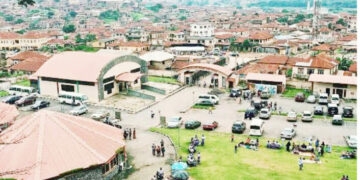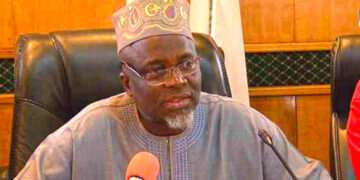The Minister of Interior, Dr Olubunmi Tunji-ojo, has categorically warned that paramilitary agencies are not poverty alleviation jobs but a career of pride.
This is even as he vehemently warned the Nigeria Correctional Service (CoS) against commercialising and treating prison facilities like bazaars, where the comfort of inmates is dependent on their economic and financial status.
Tunji-ojo warned during a summit Thursday in Abuja for high-ranking officers from the Civil Defence, Correctional, Fire, and Immigration Services.
Tunji-ojo emphasised the primary role of correctional facilities in rehabilitating and reforming offenders while respecting the rights of all inmates.
The Minister, who described paramilitary agencies as responsible for ensuring internal security, highlighted the crucial responsibility of the Nigeria Immigration Service (NIS) in maintaining national security, stating that even one lapse at the borders could have dire consequences.
He urged the NIS to transition effectively from merely issuing travel documents to managing migration and border security.
“Today, you can be accessed from the era of passport brouhaha to reawakening and movement to a migration management and border control agency.
Additionally, he commended the Nigeria Security and Civil Defence Corps (NSCDC) for their efforts in protecting critical national assets. Still, he reminded them that their core mission is distinct from police work.
The Minister also wanted the Federal Fire Service to improve emergency response times to five minutes, focusing on innovation and efficiency.
He said, “I want to see an efficient and better-placed fire service that would not just be seen as a rescue agency but as one driven by innovations and creativity.
“I want agencies that will run differently than usual. The Renewed Hope Agenda is about unusual business practices, and I want to see that reflected.
“This meeting was convened due to the realisation that the most significant challenges are coming from state controllers, comptrollers, and commandants. I would like you to desist from corruption and work towards eradicating it from your respective systems.
Tunji-Ojo categorically warned that paramilitary agencies are not poverty alleviation jobs but a career of pride. He stated, “We will no longer be counting years in service, but performance and value-added.”
He emphasised, “We cannot continue to run our services on the premise of connections. So, I am saying, enough of the negative news about officers.”
He directed, “Tell those petitioners among you that we will supply them with reams of paper. No amount of petition can stop us from doing the right thing.”
Acknowledging the reality, he added, “We are not unaware that beneficiaries of an ill society will always protest when things are being set right.”
Tunji-Ojo concluded, “We will not sacrifice the wishes of over 200 million Nigerians because of their egos or aspirations. For us here, performance is what makes officers cross the hurdle.”
“Understand that others have worn the uniform you wear before you, and just as you would want respect for your own, you must also uphold the dignity of this uniform. If you cannot contribute to enhancing the status, credibility, and respect for it, please do not tarnish it. I would appreciate it if you all could make the necessary amendments now.
He acknowledged that, despite a few bad apples within the services, all four agencies have undeniably benefitted from the momentum of the Renewed Hope Agenda.
He emphasised the importance of patriotism and urged efficiency and teamwork. He pointed out that the President has already provided and continues to provide significant support. This includes approving thousands of promotions, peculiar allowances, investment in facilities, improved airport infrastructure, control gates, Fire Academy, equipment, weaponry, and more.
In return, he asked for patriotism and urged the personnel to respect their uniforms. He noted that, like the Civil Defence Corps, they all make significant sacrifices—away from their wives, children, and families—to safeguard the nation. This commitment deserves praise. The burden of ensuring a secure, safe, and prosperous Nigeria rests on their shoulders.
He concluded by reiterating the importance of respecting the uniform and, in the spirit of our National Anthem, ensuring that they hand over an untainted legacy to the next generation.





